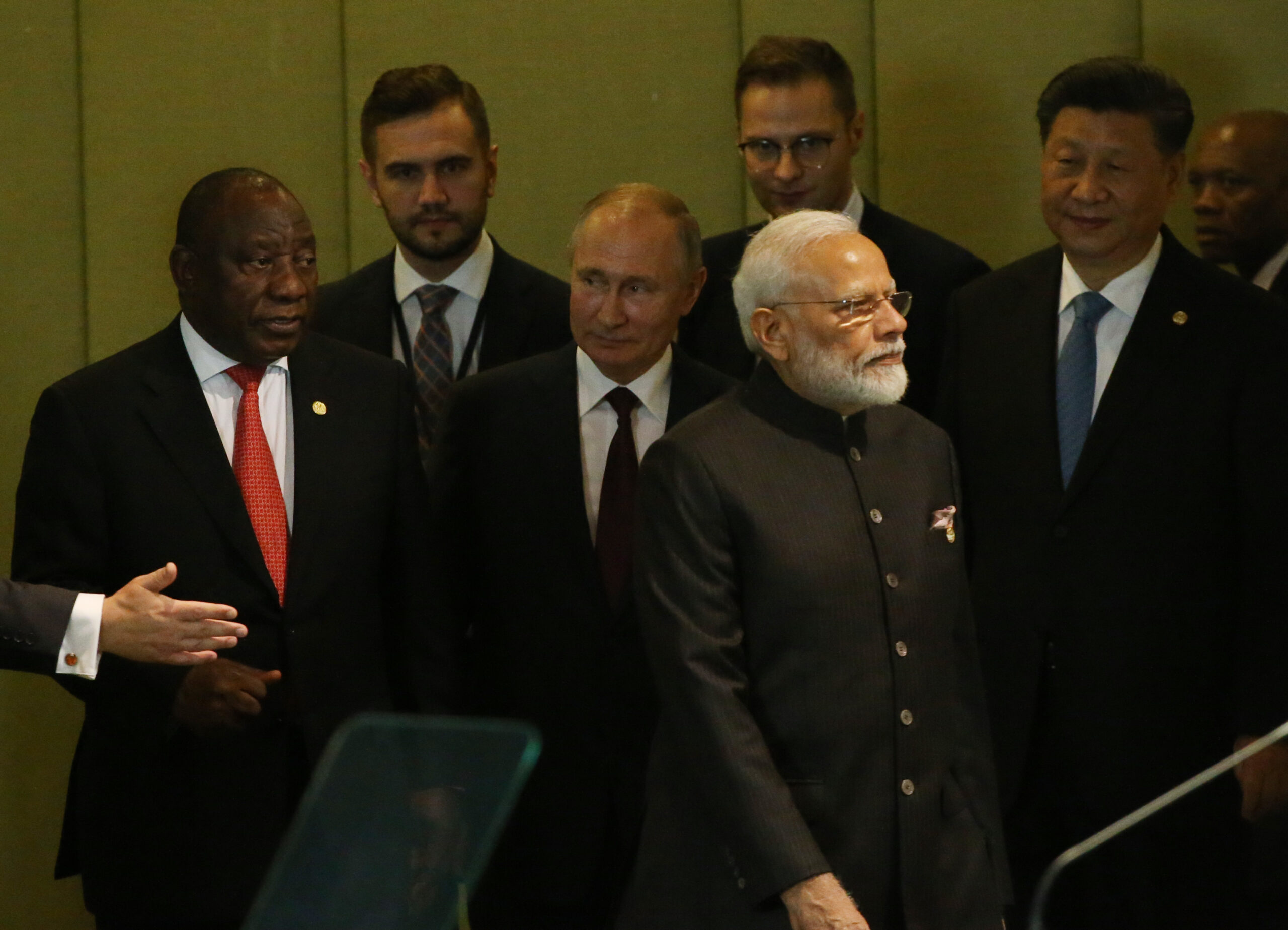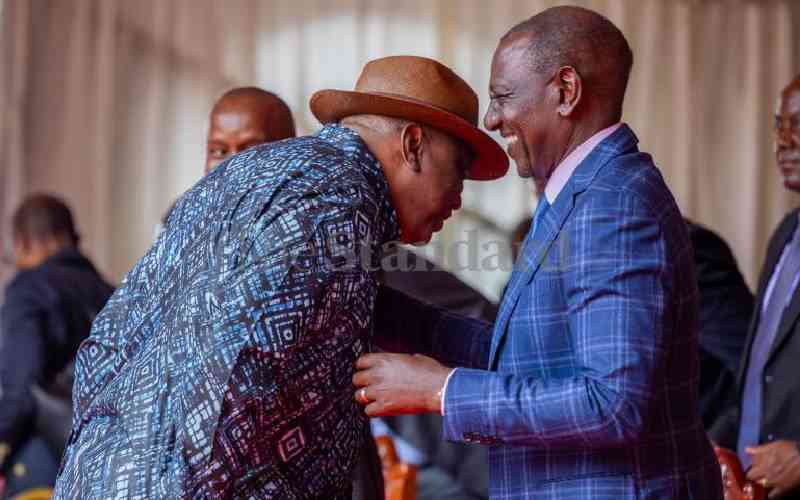President Cyril Ramaphosa stands next to leaders of other Brics nations including Russian President Vladimir Putin. (Photo by Mikhail Svetlov/Getty Images)
There is no doubt that the current economic and geopolitical conditions are fertile for imagining a post-Western world.
This is where Brics comes in. Emboldened by punishing monetary conditions, as well as a belligerent Kremlin — cut off, as it is, from the international financial system — the alliance between Brazil, Russia, India, China and South Africa is angling to expand its influence. The bloc’s endeavours to bring others, including Saudi Arabia, into the fold will form part of the deliberations at this year’s Brics summit, set to take place in Durban in August.
In the lead-up to the summit, which Russia’s President Vladimir Putin may very well attend, South Africa’s ties to Moscow are being closely scrutinised — each move disclosing just how nonaligned Pretoria truly is.
It is no wonder then that a recent diplomatic spat has put the Brics alliance’s smallest player in the crosshairs of the United States, which is grappling with what the current geopolitical shifts mean for its economic hegemony. The punishment that South Africa has endured so far, with the rand taking a painful nosedive, has sent a clear message: defy us at your peril.
In his weekly letter, President Cyril Ramaphosa was at pains to send the message that South Africa will not be made to take sides in the tug-of-war between Russia and the West. “South Africa has not been, and will not be, drawn into a contest between global powers … We do not accept that our non-aligned position favours Russia above other countries. Nor do we accept that it should imperil our relations with other countries,” he said.
Ramaphosa’s remarks come after the US ambassador to South Africa, Reuben Brigety, publicly accused the country of supplying arms to Russia.
In doing so, Brigety bypassed diplomatic channels and openly undermined South Africa’s sovereignty, earning him the admonition of International Relations Minister Naledi Pandor. He also tore the thin veil that exists to conceal America’s imperialist face.
Given South Africa’s already weak economic position, made worse by there being no end in sight to the deleterious energy crisis, attention immediately turned to the fallout. The rand fell to a record low, to R19.30 to the dollar, as investors digested the news.
Business Unity South Africa noted that, if the allegation is proven to be true, it will probably jeopardise the country’s trade relations with US and the West more broadly. And because the current diplomatic tensions have little to do with Russia, but with where it fits in the battle for economic primacy between the US and China, the business lobby group also underlined the importance of maintaining cordial relations between both superpowers.
Here lies South Africa’s dilemma. In the past, courting both the US and China may not have been easy, but it was certainly possible. But, in the wake of what some have called a second Cold War, South Africa’s nonaligned position may become more difficult to hold on to.
In its World Economic Outlook, released last month, the International Monetary Fund flagged geopolitical fragmentation, in the wake of Russia’s assault on Ukraine and the US-China trade war, as a key risk to the global economic outlook.

These conditions create a special dilemma for countries such as South Africa that wish to pursue a nonaligned path, the IMF warned. “In reality a geoeconomically fragmented world might entail substantial policy uncertainty for economies that try to remain open to both geopolitical blocs,” it noted.
“Rather than having their nonaligned status accepted, these economies may need to walk a narrow path amid pressures from both sides, with the attendant risk of falling out with one bloc or the other.”
The current rise of geoeconomic blocs is part of a longer-term resistance against globalisation, which began more than a decade ago after the global financial crisis.
Although the Bric alliance (which didn’t originally include South Africa) was first dreamed up by former Goldman Sachs chief economist Jim O’Neill in 2001, it was only in 2009 — after the global financial system came crashing down — that the bloc held its first summit in Yekaterinburg, Russia.
Pushed together by an economic crisis, the member states committed to reforming international financial institutions to reflect changes in the global economy. This meant creating an alternative to the IMF and the World Bank and challenging the dollar’s supremacy.
In the years that followed, however, there was little proof that the alliance would genuinely attempt to skew the global financial system in favour of emerging markets. It would take another economic crisis, and one of its bloc’s biggest bullies being backed into a corner, before its threats to turn on the US-led system would be taken seriously again.
The push for de-dollarisation has returned with a vengeance, with the renminbi making bigger inroads thanks in part to sanctions against Russia. Meanwhile, a decision to include Saudi Arabia — the world’s largest oil producer — in Brics could make it a powerful force against US hegemony. If Saudi aligns with Brics and allows member states to buy oil in a new reserve currency, the petrodollar system (the cornerstone of the greenback’s primacy) would be turned on its head.
But the US will not give up its position as number one without a fight. It has given South Africa a taste of the bitterness that lies ahead if the country steps out of line, a punishment that, ironically, is only as acute as the US is powerful. There will no doubt be nastiness whatever direction South Africa chooses. After all, there are warmongers on both sides.
When South Africa hitched its wagon to Brics in 2010, the country’s leaders may not have foreseen that it would eventually again become a pawn in another Cold War — and that whatever moral high-ground the country has clung on to after the Madiba era would be put in jeopardy. But here we are: non-aligned but swept up in a fight that will likely have more losers than winners.





















Discussion about this post